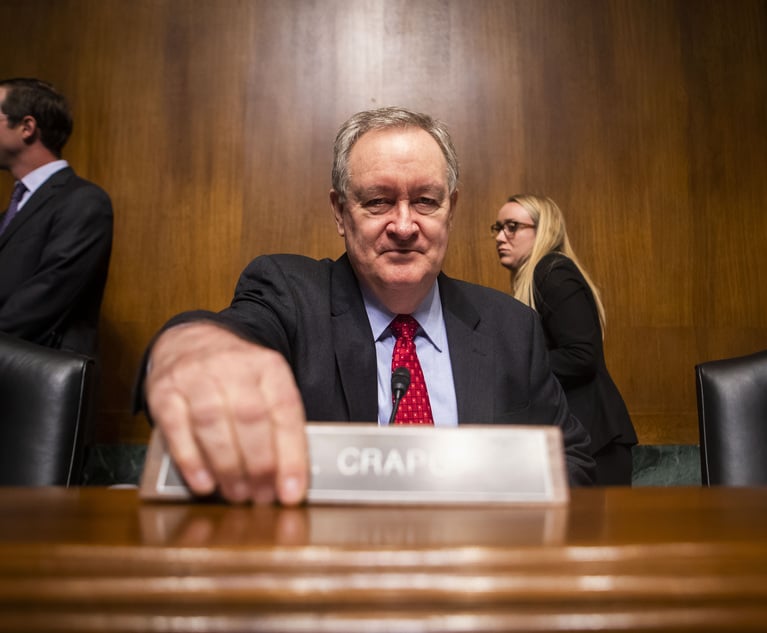Judicial Council Orders Courts to Draft New Anti-Harassment Workplace Policies
The new rule will require all 58 trial courts and seven appellate courts to establish by June 30 policies "prohibiting harassment, discrimination, retaliation, and inappropriate workplace conduct."
January 17, 2020 at 05:06 PM
5 minute read
 Tani Cantil-Sakauye, Chief Justice of California. Photo: Diego M. Radzinschi / ALM
Tani Cantil-Sakauye, Chief Justice of California. Photo: Diego M. Radzinschi / ALM
Leaders of every California court must adopt updated anti-harassment policies that detail how courthouse employees can file complaints, including those accusing presiding judges and top court executives of wrongdoing, under a new rule of court enacted by the Judicial Council Friday.
The new rule will require all 58 trial courts and seven appellate courts to establish by June 30 policies "prohibiting harassment, discrimination, retaliation, and inappropriate workplace conduct." The courts must also provide "multiple avenues" for submitting complaints and offer examples of banned behavior.
Rule 10.351 "will help remove barriers for employees to report such conduct by clearly identifying individuals to whom complaints may be made, will provide a more consistent response to complaints throughout the branch, will educate employees as to their rights and available resources, and will clarify the responsibilities of court management to prevent and address such conduct," said Third District of California Court of Appeal Justice Harry Hull Jr., who chairs the council committee that drafted the rule.
Adoption of the new guidelines comes on the heels of high-profile disciplinary proceedings against Justice Jeffrey Johnson, the Second District California Court of Appeal justice accused by the Commission on Judicial Performance of sexually harassing or acting inappropriately toward fellow jurists, research attorneys, security officers and other court employees over two decades. Johnson has denied most of the allegations. Johnson has disputed some of the report's findings. The commission has scheduled oral arguments in the case for March 18.
A Jan. 3 report on the allegations against Johnson by a panel of special masters noted that Second District court employees had expressed concerns about the lack of procedures for court employees to submit complaints about justices and others in the courthouse. Merete Rietveld, a Second District research attorney, drafted a petition in 2018 asking judicial branch leaders to review anti-harassment practices in the appellate courts, particularly when the accused is a judicial officer or court executive.
The petition, patterned after a similar letter sent by federal law clerks to U.S. Supreme Court Chief Justice John Roberts Jr. in 2017, was signed by dozens of appellate court employees and 10 justices from the courts of appeals. In October 2018, Chief Justice Tani Cantil-Sakauye created a working group to review harassment policies. That work led to the new rule enacted Friday.
Rietveld told The Recorder before Friday's council meeting she was "gratified" to see the development of the new rule, calling it a "strong message from leadership that the courts" won't ignore misconduct complaints from workers.
The new court rule gives individual courts leeway in drafting their own reporting procedures, a nod, Hull said, to different "structures, limitations and union relationships."
Some court representatives expressed concern that the rule does not offer enough specificity about definitions.
"In order to comply with the proposed rule, courts are required to have policies prohibiting 'inappropriate workplace conduct' and providing examples, yet it is entirely unclear what such conduct entails as intended by [the rules committee], and undoubtedly there will be extremely differing policies throughout the state," Summer Ryan, general counsel for the Shasta County Superior Court, wrote in public comments submitted on the then-proposed rule last year.
 State Senator Hannah-Beth Jackson
State Senator Hannah-Beth JacksonHull said Judicial Council legal staff will provide courts with a sample policy that would satisfy the new rule's requirements.
State Sen. Hannah-Beth Jackson, a Judicial Council member, also urged Hull and his committee to consider more specific guidance for ensuring that complaints will be handled in a way that assures victims their concerns are taken seriously.
"It doesn't say here who is going to do the investigation itself," Jackson said of the rule Friday.
Jackson continued: "That's actually an issue because there is some concern about the lack of objectivity and potential bias when these investigations do take place … People [are] very reluctant to come forward if they [do] not feel the investigative process would be a fair and equitable one."
Hull said courts will have a year to come up with their own workable solutions before the Judicial Council considers any new requirements or rule amendments in July 2021.
Read more:
'Failure to Take Responsibility': New Report Assails Appellate Judge Jeffrey Johnson
'I'm a Flawed Human Being,' Judge Says at Sexual Harassment Trial
CA Judge Calls Sexual Harassment Allegations at Trial 'Insulting' and Racist
Inside The Recorder's Request for Judicial Workplace Harassment Records
This content has been archived. It is available through our partners, LexisNexis® and Bloomberg Law.
To view this content, please continue to their sites.
Not a Lexis Subscriber?
Subscribe Now
Not a Bloomberg Law Subscriber?
Subscribe Now
NOT FOR REPRINT
© 2025 ALM Global, LLC, All Rights Reserved. Request academic re-use from www.copyright.com. All other uses, submit a request to [email protected]. For more information visit Asset & Logo Licensing.
You Might Like
View All
Senator Plans to Reintroduce Bill to Split 9th Circuit

California's Chief Justice Starts Third Year With Questions About Fires, Trump and AI
4 minute read

Fight Over Amicus-Funding Disclosure Surfaces in Google Play Appeal
Trending Stories
- 1Crypto Hacker’s $65 Million Scam Ends in Indictment
- 2Trump's Inspectors General Purge Could Make Policy Changes Easier, Observers Say
- 3Supporting Our Supreme Court Justices in the Guardianship Part
- 4'Erroneous Rulings'?: Wilmer Asks 4th Circuit to Overturn Mosby's Criminal Convictions
- 5Judge Orders Acquittal of Ex-Prosecutor on 1 of 2 Counts in Misconduct Trial Over Ahmaud Arbery Case
Who Got The Work
J. Brugh Lower of Gibbons has entered an appearance for industrial equipment supplier Devco Corporation in a pending trademark infringement lawsuit. The suit, accusing the defendant of selling knock-off Graco products, was filed Dec. 18 in New Jersey District Court by Rivkin Radler on behalf of Graco Inc. and Graco Minnesota. The case, assigned to U.S. District Judge Zahid N. Quraishi, is 3:24-cv-11294, Graco Inc. et al v. Devco Corporation.
Who Got The Work
Rebecca Maller-Stein and Kent A. Yalowitz of Arnold & Porter Kaye Scholer have entered their appearances for Hanaco Venture Capital and its executives, Lior Prosor and David Frankel, in a pending securities lawsuit. The action, filed on Dec. 24 in New York Southern District Court by Zell, Aron & Co. on behalf of Goldeneye Advisors, accuses the defendants of negligently and fraudulently managing the plaintiff's $1 million investment. The case, assigned to U.S. District Judge Vernon S. Broderick, is 1:24-cv-09918, Goldeneye Advisors, LLC v. Hanaco Venture Capital, Ltd. et al.
Who Got The Work
Attorneys from A&O Shearman has stepped in as defense counsel for Toronto-Dominion Bank and other defendants in a pending securities class action. The suit, filed Dec. 11 in New York Southern District Court by Bleichmar Fonti & Auld, accuses the defendants of concealing the bank's 'pervasive' deficiencies in regards to its compliance with the Bank Secrecy Act and the quality of its anti-money laundering controls. The case, assigned to U.S. District Judge Arun Subramanian, is 1:24-cv-09445, Gonzalez v. The Toronto-Dominion Bank et al.
Who Got The Work
Crown Castle International, a Pennsylvania company providing shared communications infrastructure, has turned to Luke D. Wolf of Gordon Rees Scully Mansukhani to fend off a pending breach-of-contract lawsuit. The court action, filed Nov. 25 in Michigan Eastern District Court by Hooper Hathaway PC on behalf of The Town Residences LLC, accuses Crown Castle of failing to transfer approximately $30,000 in utility payments from T-Mobile in breach of a roof-top lease and assignment agreement. The case, assigned to U.S. District Judge Susan K. Declercq, is 2:24-cv-13131, The Town Residences LLC v. T-Mobile US, Inc. et al.
Who Got The Work
Wilfred P. Coronato and Daniel M. Schwartz of McCarter & English have stepped in as defense counsel to Electrolux Home Products Inc. in a pending product liability lawsuit. The court action, filed Nov. 26 in New York Eastern District Court by Poulos Lopiccolo PC and Nagel Rice LLP on behalf of David Stern, alleges that the defendant's refrigerators’ drawers and shelving repeatedly break and fall apart within months after purchase. The case, assigned to U.S. District Judge Joan M. Azrack, is 2:24-cv-08204, Stern v. Electrolux Home Products, Inc.
Featured Firms
Law Offices of Gary Martin Hays & Associates, P.C.
(470) 294-1674
Law Offices of Mark E. Salomone
(857) 444-6468
Smith & Hassler
(713) 739-1250






